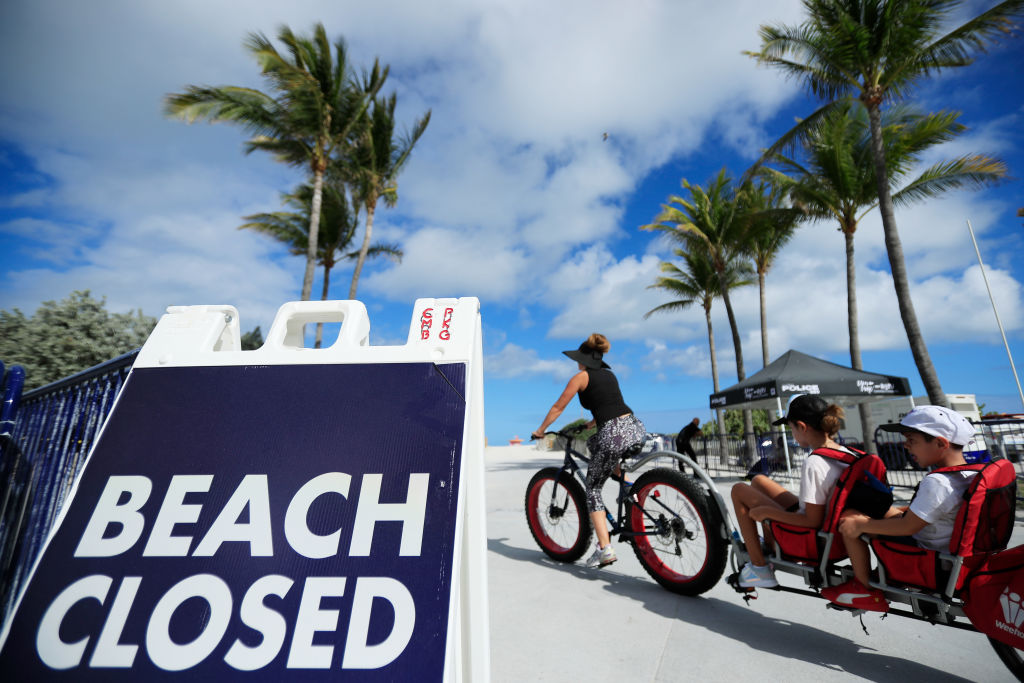Americans probably could, pretty clearly won't, beat COVID-19 in 14 days, experts say


A free daily email with the biggest news stories of the day – and the best features from TheWeek.com
You are now subscribed
Your newsletter sign-up was successful
"Terrifying though the coronavirus may be, it can be turned back," Donald McNeil Jr. writes in Sunday's New York Times. "This contagion has a weakness," spreading mostly though "clusters of family members, friends, and work colleagues" for reasons nobody fully understands. "But experts see an opening nonetheless," he adds. China, South Korea, Singapore, and Taiwan have largely stopped the spread of the new coronavirus, and the U.S. could, too, with "intelligent, rapidly adaptive work by health officials, and near-total cooperation from the populace." That means strict adherence to "extreme social distancing," McNeil explains:
If it were possible to wave a magic wand and make all Americans freeze in place for 14 days while sitting six feet apart, epidemiologists say, the whole epidemic would sputter to a halt. The virus would die out on every contaminated surface and, because almost everyone shows symptoms within two weeks, it would be evident who was infected. If we had enough tests for every American, even the completely asymptomatic cases could be found and isolated. The crisis would be over.Obviously, there is no magic wand, and no 300 million tests. But the goal of lockdowns and social distancing is to approximate such a total freeze. [The New York Times]
President Trump aspired to something like that in an all-caps tweet Sunday night, evidently after watching a segment on Fox News.
The U.S. isn't China, though, or even South Korea, and the U.S. has gotten a late start. Trump also isn't proposing any of the strict shelter-in-place measures that have worked in Asia and failed when rolled out slowly and piecemeal in Italy, leaving states and local governments to come up with their own, wildly divergent responses. Regardless, it's "not at all clear that a nation so fundamentally committed to individual liberty and distrustful of government could learn to adapt to many of these measures, especially those that smack of state compulsion," McNeil writes. That leaves persuasion as America's best hope.
The Week
Escape your echo chamber. Get the facts behind the news, plus analysis from multiple perspectives.

Sign up for The Week's Free Newsletters
From our morning news briefing to a weekly Good News Newsletter, get the best of The Week delivered directly to your inbox.
From our morning news briefing to a weekly Good News Newsletter, get the best of The Week delivered directly to your inbox.
You can read more about what America should be doing to beat COVID-19 at The New York Times.
A free daily email with the biggest news stories of the day – and the best features from TheWeek.com
Peter has worked as a news and culture writer and editor at The Week since the site's launch in 2008. He covers politics, world affairs, religion and cultural currents. His journalism career began as a copy editor at a financial newswire and has included editorial positions at The New York Times Magazine, Facts on File, and Oregon State University.
-
 Is Andrew’s arrest the end for the monarchy?
Is Andrew’s arrest the end for the monarchy?Today's Big Question The King has distanced the Royal Family from his disgraced brother but a ‘fit of revolutionary disgust’ could still wipe them out
-
 Quiz of The Week: 14 – 20 February
Quiz of The Week: 14 – 20 FebruaryQuiz Have you been paying attention to The Week’s news?
-
 The Week Unwrapped: Do the Freemasons have too much sway in the police force?
The Week Unwrapped: Do the Freemasons have too much sway in the police force?Podcast Plus, what does the growing popularity of prediction markets mean for the future? And why are UK film and TV workers struggling?
-
 Trump HHS slashes advised child vaccinations
Trump HHS slashes advised child vaccinationsSpeed Read In a widely condemned move, the CDC will now recommend that children get vaccinated against 11 communicable diseases, not 17
-
 FDA OKs generic abortion pill, riling the right
FDA OKs generic abortion pill, riling the rightSpeed Read The drug in question is a generic version of mifepristone, used to carry out two-thirds of US abortions
-
 RFK Jr. vaccine panel advises restricting MMRV shot
RFK Jr. vaccine panel advises restricting MMRV shotSpeed Read The committee voted to restrict access to a childhood vaccine against chickenpox
-
 Texas declares end to measles outbreak
Texas declares end to measles outbreakSpeed Read The vaccine-preventable disease is still spreading in neighboring states, Mexico and Canada
-
 RFK Jr. shuts down mRNA vaccine funding at agency
RFK Jr. shuts down mRNA vaccine funding at agencySpeed Read The decision canceled or modified 22 projects, primarily for work on vaccines and therapeutics for respiratory viruses
-
 Measles cases surge to 33-year high
Measles cases surge to 33-year highSpeed Read The infection was declared eliminated from the US in 2000 but has seen a resurgence amid vaccine hesitancy
-
 Kennedy's vaccine panel signals skepticism, change
Kennedy's vaccine panel signals skepticism, changeSpeed Read RFK Jr.'s new vaccine advisory board intends to make changes to the decades-old US immunization system
-
 Kennedy ousts entire CDC vaccine advisory panel
Kennedy ousts entire CDC vaccine advisory panelspeed read Health Secretary RFK Jr. is a longtime anti-vaccine activist who has criticized the panel of experts
